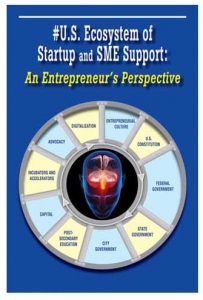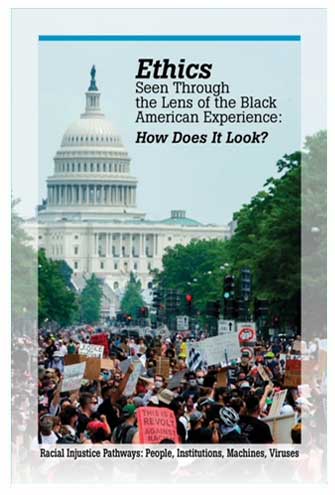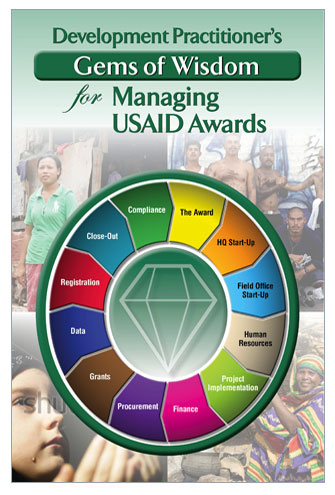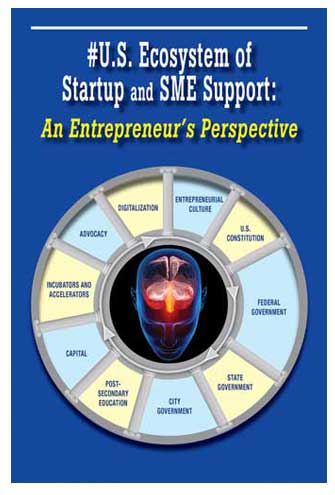New Book!
 We are pleased to announce our new book, #U.S. Ecosystem of Startup and SME Support: An Entrepreneur’s Perspective!
We are pleased to announce our new book, #U.S. Ecosystem of Startup and SME Support: An Entrepreneur’s Perspective!
In 2017, 23 U.S. startups became unicorns, scoring valuations of $1 billion or more.
There was a time, not long ago, when a startup worth $1 billion or more was a rare, almost mythical thing — a “unicorn”. But in the past few years, unicorns have become far more plentiful, more like horses. In fact, dozens of startups were crowned with unicorn status worldwide, including these 23 US companies, according to CB Insight’s list of unicorns (cbinsights.com)
Clearly, everyone wants a unicorn in their stable to help them win the race. The “race” is to develop, diversify, grow, and transform economies. Every country—and multiple competing areas within them—are vying to host and support the next unicorn.
The question is, what does it take to nurture and grow a unicorn—that “special” high-tech firm that embraces and harnesses technology in unimaginable ways and is capable of transforming technology itself?
What are the pillars of an ecosystem that could or has helped produce unicorns and startups—even without that unicorn levels of investment capital— that wound up changing the world?
What did Steve Jobs leverage from the ecosystem that enabled him to start something in his garage that has today become the first $1 trillion-valued company in America? Was it the place in which he was located, Silicon Valley; was it his academic preparation; was it his access to financing; what was it, exactly?
Perhaps the question should be asked in the reverse, focusing not so much on the presence of affirmative actions but rather on the absence of conditions that would have prevented him from succeeding.
It’s reminiscent of when Sir Edmund Hillary became the first person to climb Mount Everest and people asked him why he did that and he allegedly answered, “because it was there.” In other words, there was an opportunity and he seized it because he could, and nothing got in his way. It was the same for Steve Jobs; he climbed “Mount Apple” because he could, and nothing got in his way.
The main issue is whether the enabling environment enables or disables.
Steve Jobs could have been shut down at multiple junctures during his road to success by a “disabling” environment. The doors to his success could have been slam shut early on by the absence of Intellectual Property Rights, by underdeveloped contract law, by inadequate consumer access to broadband, by non-protective securities and exchange laws, and so on. Rights, protections, access, market order enable, and are among the conditions needed to enable startups to realize their full potential.
The purpose of this book is to show how to get out of the way of the next unicorn by ensuring that they and all startups have the rights, protections, access, and market order they need to win the race.
This book shows how the U.S. enables winners and argues that the weightbearing strength of the 10 main pillars and their 33 sub-pillars of the U.S. ecosystem of support for all startups is the key to enabling their success.
The author, Dr. Sharon T. Freeman, is an entrepreneur who has started-up multiple enterprises in Hong Kong and in the U.S.. She has also worked with startups and SMEs in over 100 countries. This book draws on her rich firsthand entrepreneurship experience and on volumes of subject matter research and expertise throughout the U.S. and the world.
Readers will walk away with a richer, deeper, and more nuanced understanding of what it has taken to create a “Silicon Valley” in America and the conditions for others to follow in its footsteps.
This book is available directly from the author and publisher at www.gemsofwisdomconsulting and from Amazon.

1629 K St, NW, Suite 300 - Washington, DC 20006
Phone: (202) 669-1691
info@gemsofwisdomconsulting.com





